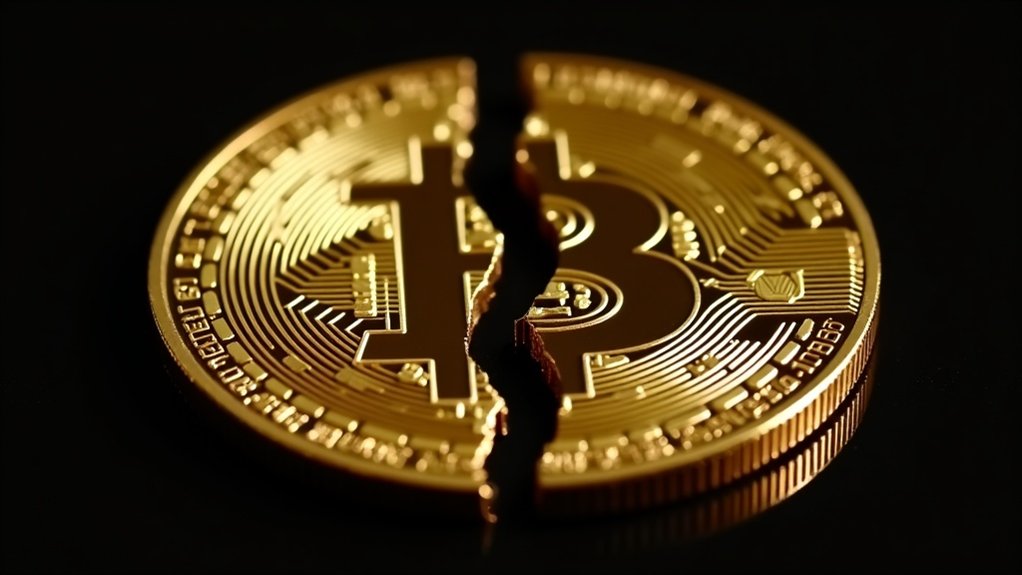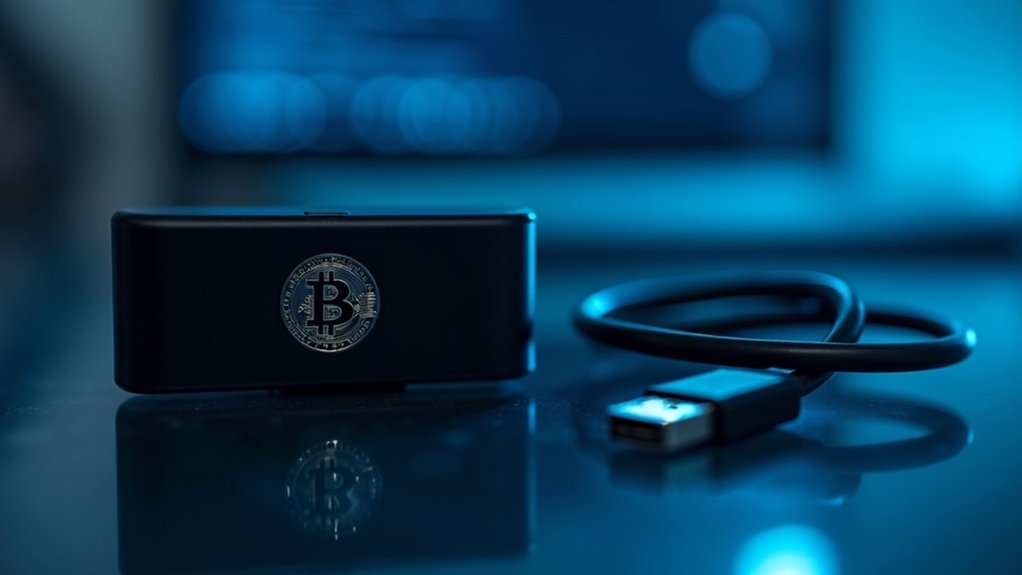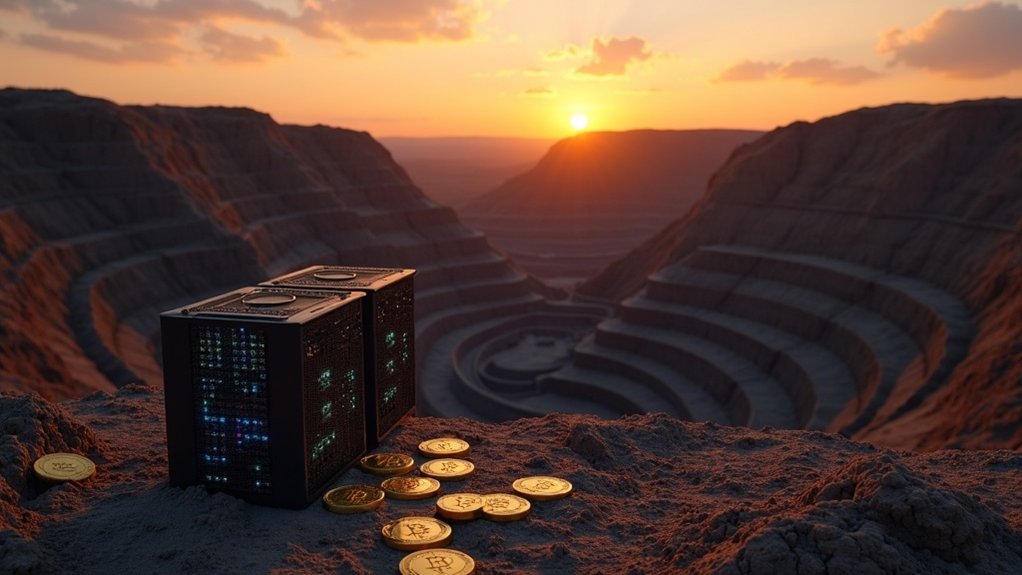Bitcoin Cash is a cryptocurrency that split from Bitcoin in August 2017. Born from scalability disputes, it features larger 32MB blocks compared to Bitcoin’s 1MB limit. This design enables faster transactions—about 15-20 times Bitcoin’s capacity—with lower fees. BCH positions itself as “digital cash” for everyday purchases rather than just a store of value. The fork gave Bitcoin holders equivalent amounts of BCH when the blockchain divided. The technical differences reveal why some merchants prefer it for small transactions.
Where did Bitcoin Cash come from?
It was born in August 2017, the result of a heated crypto-family feud.
Bitcoin’s community couldn’t agree on how to fix its scalability problems.
One side wanted to keep Bitcoin’s 1 MB block size.
The other wanted bigger blocks for more transactions.
Nobody backed down.
The solution? A hard fork.
The blockchain split in two, and Bitcoin Cash emerged with its own identity.
When the hard fork occurred, holders of Bitcoin automatically received an equal amount of BCH.
BCH immediately distinguished itself with an 8 MB block size—later increased to a whopping 32 MB.
Bitcoin Cash didn’t mess around—32 MB blocks crush Bitcoin’s puny 1 MB limit, handling way more transactions per block.
That’s 32 times Bitcoin’s capacity.
More space means more transactions can fit in each block.
More transactions equal faster processing and lower fees.
Pretty simple math.
Bitcoin Cash uses the same proof-of-work consensus mechanism as its parent.
It’s still decentralized.
Transactions are still irreversible.
The main difference? BCH can handle about 116 transactions per second—roughly 15-20 times what Bitcoin manages.
Still not Visa’s 1,700 transactions per second, but it’s trying.
This increased capacity was essential to address the slow transaction speeds that had plagued the original Bitcoin network.
BCH functions as a peer-to-peer system that eliminates the need for banks or intermediaries.
BCH calls itself “digital cash” rather than “digital gold.”
There’s a reason for that.
Bitcoin evolved into a store of value, something you hodl for the future.
Bitcoin Cash wants to be used for coffee, groceries, and everyday purchases.
Low fees make small transactions practical.
No one wants to pay a $5 fee on a $3 coffee.
That’s just stupid.
Since 2018, BCH has added support for smart contracts, expanding beyond simple transfers.
This opens doors to more complex applications.
Businesses increasingly accept BCH for payments because it’s faster and cheaper than Bitcoin.
The core philosophy difference is clear: Bitcoin prioritizes security and decentralization above all.
Bitcoin Cash emphasizes scalability and usability.
One for storing wealth, one for spending it.
Same family tree, different branches.
That’s the Bitcoin Cash story—a cryptocurrency designed to be spent, not just saved.
Frequently Asked Questions
How Does Bitcoin Cash Differ From Bitcoin?
Bitcoin Cash differs from Bitcoin primarily through its larger block size (32MB vs. 1MB), allowing faster processing of 61-200 transactions per second compared to Bitcoin’s measly 3-7 TPS.
BCH maintains penny-level fees while BTC’s can skyrocket during congestion. Different visions too – Bitcoin positions itself as “digital gold” while Bitcoin Cash aims to be actual “digital cash” for everyday transactions.
BCH adjusts mining difficulty more frequently but has lower hashrate security. Same 21 million coin cap though.
Is Bitcoin Cash a Good Investment?
Bitcoin Cash shows mixed investment potential. Price forecasts suggest growth to $800 by 2025 and possibly $2,500 by 2030. Technical indicators look promising—increased futures interest and 80% bullish sentiment signals.
But let’s be real. BCH has never matched Bitcoin’s dominance since forking in 2017. It’s faster and cheaper, sure, but remains volatile and faces stiff competition.
The crypto market’s unpredictability means nothing’s guaranteed. High risk, potential reward. Simple as that.
Where Can I Buy Bitcoin Cash?
Bitcoin Cash is available on several major exchanges.
Gemini offers ISO-certified security for immediate purchases. Coinbase lets users start with just $1, supporting bank transfers and cards. Kraken provides 200+ trading pairs.
BitPay accepts numerous payment methods including credit cards and PayPal. Cash App supports purchases starting at $1 with mobile convenience.
Most platforms require ID verification.
Payment options span wire transfers, bank accounts, cards, and digital wallets like Apple Pay and Google Pay.
What Are the Risks of Investing in Bitcoin Cash?
Investing in Bitcoin Cash carries significant risks. It’s wildly volatile, with prices swinging dramatically based on market sentiment.
Regulatory uncertainties loom large—governments could crack down anytime.
BCH faces fierce competition from Bitcoin and newer cryptocurrencies. If it can’t keep up technologically, it’s toast.
Limited merchant adoption remains a problem. Liquidity issues can make large trades difficult.
No investment guarantees here. The crypto market doesn’t care about your financial goals. Period.
Can Bitcoin Cash Replace Traditional Payment Systems?
Bitcoin Cash could theoretically replace traditional payment systems, but reality’s messier.
Its 32MB blocks and penny-level fees beat Bitcoin for everyday transactions. Nice!
But BCH faces massive hurdles: limited merchant adoption, regulatory uncertainty, and consumer habits that die hard.
Traditional systems have universal acceptance and established infrastructure.
Plus, BCH’s smaller network makes it less secure than Bitcoin.
The tech’s promising, but global payment dominance? That’s a long, winding road ahead.









